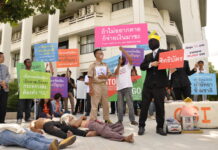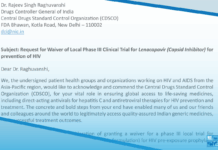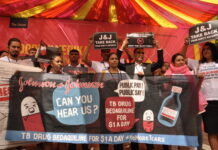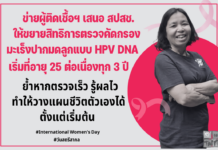20th June 2025: We, the undersigned Thai civil society organizations, who have been closely monitoring the Free Trade Agreement (FTA) negotiations between Thailand and the European Union (EU), express our grave concern over the potential wide-ranging and adverse consequences of this agreement. These include significant risks to agriculture, food security, environment, labour rights, access to medicines, universal health coverage, the influx of harmful goods such as alcoholic beverages, and other sensitive matters. We call on the negotiating team and the Thai government to conduct these negotiations with caution, transparency, and a steadfast commitment to protecting the rights and welfare of the Thai people – not to pursue short-term commercial gains at the cost of long-term public and social harms.
We therefore make the following urgent demands to the government and the negotiators of Thailand:
1. Intellectual Property: The agreement must not contain provisions exceeding the World Trade Organization’s TRIPs Agreement, particularly those that would undermine and negatively impact access to medicines, threaten Thailand’s three national health insurance schemes and public health infrastructure, weaken the domestic pharmaceutical industry and its innovation ecosystem, or compromise national medicine security.
2. Farmers’ Rights and Seed Sovereignty: Thailand must not be forced to become a party to the International Convention for the Protection of New Varieties of Plants 1991 (UPOV 1991) or to agree to any provisions requiring domestic laws to comply with it. Doing so would erode farmers’ rights to save and exchange seeds, dismantle the benefit-sharing mechanism under the Plant Varieties Protection Act B.E. 2542, increase seed prices, and jeopardize Thailand’s biodiversity and food security.
3. Market Access and Protection of Small Producers: Thailand must not liberalize imports in a way that harms small- and medium-scale producers or undermines public health.
Specifically:
3.1) Tariffs on agricultural products (e.g., pork, offal, corn, soybeans) must not be reduced to levels that cripple local farmers facing higher production costs. Robust health safeguards must be in place for inedible offal and enforceable immediately to address the impact.
3.2) Tariffs on alcoholic beverages must be maintained. Liberalization in this sector threatens both small domestic producers (now allowed under revised national law) and public health. A robust special consumption tax regime and safeguard mechanisms must be adopted prior to the conclusion of the agreement, as Vietnam has done.
4. Policy Space for Public Protection: The FTA must preserve Thailand’s right to implement and uphold policies protecting consumers, the environment, public health and social welfare.
5. Government Procurement: Thailand must retain the right to use public procurement to support domestic innovations, industrial development, pharmaceutical security including medical supplies and devices, and technology transfer through offset policies that maximize national budget and national benefit.
6. Sanitary and Phytosanitary Measures (SPS): Thailand must preserve its right to apply the precautionary principle and measures to protect human, animal, plant life, as well as the environment beyond the limited scope of WTO SPS Article 5.7.
7. Digital Trade:
7.1) Negotiations shall focus on regulatory cooperation and knowledge sharing and exchange of best practices, not binding commitments that limit domestic regulatory flexibility.
7.2) Thailand must retain sovereign control over cross-border data flows to safeguard personal data and national security.
7.3) Thailand must reject clauses that:
7.3.1) Impose restrictions on the localisation of data for storage or processing, which would severely impact the government’s ability to implement important policies, such as enforcing personal data protection laws, collecting digital taxes, and determining the operators’ responsibilities.
7.3.2) Limit the government’s authority to require pre-authorization for high-risk online services, thereby depriving Thailand of a crucial mechanism to effectively regulate such services as the operation of digital financial platforms or online lending services in Thailand, especially without adequate oversight or necessary due diligence.
7.3.3) Prohibit customs duties on electronic data transmissions, which would have a direct and severe impact on the country’s tax base and fiscal sovereignty. This would undermine significant tax revenue for the government and affect its ability to use such revenue for public purposes.
8. Trade and Sustainable Development (TSD): Negotiations must advance equity, sustainability, and climate justice by:
8.1) Adjusting the TSD framework to be in line with the principle of fairness, to adhere to the principle of differentiated responsibilities, and to promote supportive cooperation rather than unilateral conditions;
8.2) Designing a “fair transition” mechanism for trading partners, including technology transfer, access to capital, and appropriate adjustment periods;
8.3) Rejecting all types of carbon market mechanisms for greenhouse gas reduction, but adopt a non-market approach by allowing major carbon emitting groups to directly reduce carbon emissions based on the principle of differentiated responsibilities (whoever emits greenhouse gases and causes more ecological damage must be responsible for the greater extent of the problems created);
8.4) Recognizing and supporting a variety of approaches to nature care (Pluriversal Environmentalism), opening space for communities, local wisdom, and indigenous rights to determine biodiversity conservation guidelines and resource management to cope with climate change;
8.5) Supporting a transformation toward a nature-friendly economy by 2050. The new trade framework should be based on economic system transformation, not just reducing impacts, but also promoting the restoration of the natural world and aligned with the goals of the Kunming-Montreal Agreement on Global Biodiversity 2022;
8.6) Promoting the enhancement of laws related to environmental protection and public health within the Parties. The trade negotiation parties shall have environmental laws and standards for the disclosure of information on pollution sources in accordance with the principles of the Pollutant Release and Transfer Register (PRTR) and legal regulations that promote transparency in the provision of chemical information on the labels of plastic products and other products on a par with each other; and
8.7) Ensuring that the right to use animal labour in accordance with cultural practices, under the animal welfare laws and standards of the Parties, which are part of cultural diversity, shall not be used as a condition or barrier to trade.
9. Labour Rights: The Thai government must immediately ratify the two core conventions of the International Labour Organization (ILO) on freedom of association and collective bargaining, namely Convention No. 87 on Freedom of Association and Protection of the Right to Organise, 1948, and Convention No. 98 on the Implementation of the Principles of the Right to Organise and Collective Bargaining, 1949.
10. Transparency and Participation: The government and state agencies responsible for the negotiations must ensure equal access to the content of the negotiations to the private sector and civil society to ensure transparency in the negotiations and public participation both directly and through parliamentary process.
11. Public Interest Provisions: The Thai negotiation team should proactively advance provisions that:
11.1) Ensure real and practical technology transfer that promotes innovation;
11.2) Promote equity and address negative impacts from commercial determinants of health (CDoH), ensuring polluting industries are held accountable and trade truly contributes to sustainable development, as recommended by the WHO and UN.
We are deeply concerned by the Thai government’s stance in rushing the negotiator team to conclude the FTA negotiations by the end of 2025. It seems that the Thai government focuses only on the expected commercial benefits, not on the negative impacts on the general public and marginalized groups. Such a stance will pressure the Thai negotiator team to be unable to work independently and negotiate carefully, based on sufficient information to protect the interests of the public.
Therefore, we request the government, especially the Minister of Commerce, to lift time constraints and allow the negotiators the independence and time required to work at their full capability to safeguard national and public interest. The Minister should encourage the negotiators to take into account the interests and negative impacts of the majority of the people as the main consideration, and to comply with the Thai negotiating framework that the government and parliament have already approved. This includes encouraging government agencies to conduct comprehensive and credible academic studies of the impacts of the agreement, to provide empirical data for use in negotiations.
Finally, we would like to ask the government and the parliament of Thailand to support the amendment of the entire constitution, by fully respecting the voices of the people, especially Article 178, which is related to the negotiations of international treaties, regarding transparency, access to information and content of agreements, public hearings and participation, fair compensation and remedies that take into account both those who are disadvantaged and those who are advantaged, by taking Article 190 of the 2007 constitution as the example.
Signatories:
1. Alternative Agriculture Network of Thailand
2. Assembly of the Poor
3. Bangkok Consumer Rights Center Network
4. BioThai Foundation
5. Eastern Relations of Labour Group
6. Ecological Alert and Recovery – Thailand (EARTH)
7. FTA Watch
8. Healthy Forum Network
9. ILO 87/98 Driving Network
10. Migrant Working Group
11. National Farmers Council
12. Non Chueak Seed and Agricultural Processing Enterprise Group
13. Textile, Garment and Leather Workers’ Federation of Thailand
14. Thai Climate Justice for All (TCJA)
15. Thai Network of People Living with HIV/AIDS (TNP+)
16. Thailand Consumers Council (TCC)
17. Thailand Pesticide Alert Network (Thai-PAN)
18. Workers Union











